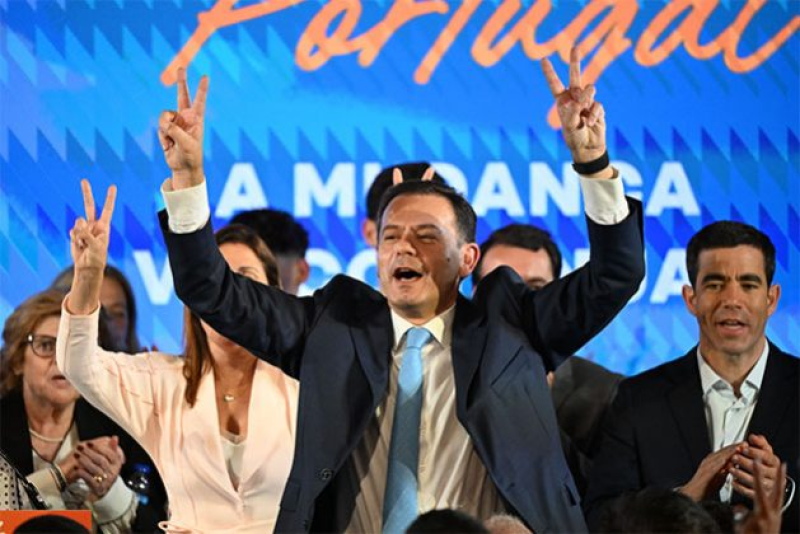- India Sees 9% Drop in Foreign Tourists as Bangladesh Visits Plunge |
- Dhaka Urges Restraint in Pakistan-Afghan War |
- Guterres Urges Action on Safe Migration Pact |
- OpenAI Raises $110B in Amazon-Led Funding |
- Puppet show enchants Children as Boi Mela comes alive on day 2 |
Portugal Ends Exception to Europe’s Far-Right Rise

Photo Credit: Zed Jameson/Anadolu Agency via Getty Images
For decades, Portugal stood as a beacon of democratic stability in an increasingly unsettled Europe. While neighbours grappled with political fragmentation and the rise of far-right movements, Portugal maintained its two-party system, a testament to the enduring legacy of the 1974 Carnation Revolution that peacefully transitioned the country from dictatorship to democracy. It was long believed that Portugal’s extensive pre-revolution experience of repressive right-wing rule had effectively inoculated it against far-right politics, but that assumption is now demonstrably outdated. An era of exceptionalism ended on 18 May, when the far-right Chega party secured 22.8 per cent of the vote and 60 parliamentary seats, becoming the country’s main opposition force.
This represents more than an electoral upset; it marks the collapse of five decades of democratic consensus and Portugal’s reluctant entry into the European mainstream of political polarisation. Chega could hold the balance of power. The centre-right Democratic Alliance, led by Prime Minister Luís Montenegro, won the most parliamentary seats but fell far short of the 116 needed for a majority. Meanwhile, the Socialist Party, which governed from 2015 to 2024, suffered its worst defeat since the 1980s, relegated to third place by a party that’s only six years old.
Chega’s meteoric rise from just 1.3 per cent of the vote and one seat in 2019 to its role as today’s main opposition demonstrates how quickly political landscapes can shift when mainstream parties fail to address people’s fundamental concerns. The roots of the transformation lie in a toxic combination of economic pressure and political failure that has systematically eroded public confidence in the political establishment.
Portugal has endured three elections in under four years, a sign of its novel state of chronic instability. The immediate trigger for the latest election was the collapse of Montenegro’s government following a confidence vote, with opposition parties citing concerns over potential conflicts of interest involving his family business. This followed the previous Socialist government’s fall in November 2023 amid corruption investigations, creating a recurring cycle of scandal, government crisis and electoral upheaval.
The political turmoil unfolds against a backdrop of mounting social challenges that mainstream parties have failed to adequately address. Despite its economy growing by 1.9 per cent in 2024, well above the European Union average, Portugal faces a severe housing crisis that has become the defining issue for many voters, particularly those from younger generations. Portugal now has the worst housing access rates of all 38 OECD countries, with house prices more than doubling over the past decade.
In Lisbon, rents have jumped by 65 per cent since 2015, making the capital the world’s third least financially viable city due to its punishing combination of soaring housing costs and traditionally low wages. This crisis, driven by tourism, foreign investment and short-term rentals, has pushed property ownership beyond most people’s reach, creating widespread frustration with governments perceived as ineffective or indifferent to everyday struggles.
Immigration has provided another flashpoint. The number of legal migrants tripled from under half a million in 2018 to over 1.5 million in 2025. This rapid demographic change has fuelled populist narratives about uncontrolled migration and its alleged impact on housing and employment markets. It was precisely these grievances that Chega, led by former TV commentator André Ventura, expertly exploited.
As an outsider party untainted by association with the cycle of scandals and governmental collapses, Chega positioned itself as the defender of ‘western civilisation’ and channelled anti-establishment anger into electoral success. It combines promises to combat corruption and limit immigration with a defence of what it characterises as traditional Portuguese values, including through extreme criminal justice policies such as chemical castration for repeat sexual offenders.
Despite Ventura’s insistence that Chega simply advocates equal treatment without ‘special privileges’, the party’s ranks include white supremacists and admirers of former dictator António Salazar. Its openly racist approach to immigration and hostility towards women, LGBTQI+ people, Muslims and Roma people reflects a familiar far-right playbook that has proven successful across Europe. Chega has cultivated significant connections with Marine Le Pen’s National Rally in France, Germany’s Alternative for Germany, and Spain’s Vox party, and Ventura was among the European far-right leaders invited to Donald Trump’s inauguration.
Montenegro has so far refused to work with Chega, which he has publicly characterised as demagogic, racist and xenophobic – a rejection that may have inadvertently strengthened Chega’s anti-establishment credentials. However, the arithmetic of Portugal’s fractured parliament suggests that any significant policy initiatives will require either Socialist abstention or, more controversially, Chega support, creating new opportunities for far-right influence, particularly on criminal justice and immigration policies.
Portugal’s experience offers sobering evidence that far-right influence should no longer be viewed as a passing fad but rather as an established feature of contemporary European politics. The speed of the shift offers a stark reminder that no democracy is immune to the populist pressures reshaping the continent.
The question now is whether Portugal’s institutions can adapt to govern effectively in this new fractured landscape while preserving democratic values. Portugal’s civil society has an increasingly vital part to play in holding newly influential far-right politicians to account and offering collective responses to populist challenges.
Inés M. Pousadela is CIVICUS Senior Research Specialist, co-director and writer for CIVICUS Lens and co-author of the State of Civil Society Report.

